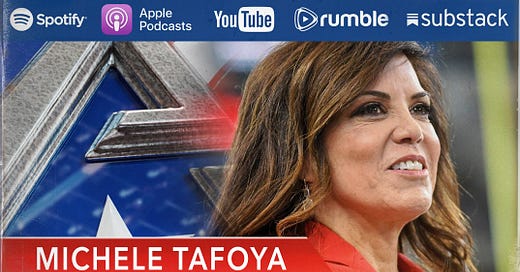Michele Tafoya deconstructs the current issues in sports, particularly as they relate to men competing against women. You won't want to miss this episode with icon and firebrand, Michele Tafoya! [See transcript below]
Also available through your favorite podcast provider!
TRANSCRIPT:
[ALLEN] Greetings everyone. Lieutenant Colonel Allen West here and welcome to the Steadfast and Loyal Podcast.
[MUSIC] Save us all. They're gonna burn it down. Save us all. Before they burn it down. [/MUSIC]
[ALLEN] Hey ladies and gentlemen, welcome back to the Steadfast and Loyal Podcast. And you know the greatness of America is that a kid that was born in the inner city of Atlanta, Georgia in a Blacks-only hospital gets to speak with people that he has watched on TV and share thoughts and perspectives and insights with them. And so a real special person is joining us today, and that is Michele Tafoya.
Michele Tafoya is a four-time Emmy award-winning sportscaster and now a political and cultural commentator. Michele worked her final NBC Sunday Night Football game at Super Bowl 56 on February 13, 2022, and that was her fifth Super Bowl. She retired from sportscasting the following day. In total, she covered 327 games, the most national prime-time TV games, regular and post-season for an NFL sideline reporter. And I think I saw probably 250, maybe 300 of those games. Tafoya, who began her sports media career in 1993, is the most honored national television sideline reporter in US sports history for Emmys for outstanding sports personality sports reporter and is also the only finalist for that Emmy in each year of its existence since 2011. The American Women in Radio and Television honored Tafoya twice with a Gracie Award in 2014 for outstanding on-air talent in a sports program for her work as a sideline reporter on Sunday Night Football and in 1997 for outstanding achievement by an individual on-air TV personality for her WNBA work with Lifetime. The American Sportscasters Association voted Tafoya among the top female sportscasters, number four in 2009, while the Davie Brown Index ranked her among the most likable. And I agree with that. TV sports personalities in 2016, including biggest trendsetter.
Michele Tafoya, thank you so much. Welcome to the Steadfast and Loyal podcast. It's such an honor to be with you. And it's funny to hear all that stuff in retrospect. I mean, I don't know that I was ever a trendsetter. Maybe I just can't see it, but you know, I always, always honored by those, by those nice accolades. Well, let's add humble as well to that. And I think that that is what makes you that total package. So what got you engaged and involved in being a sportscaster and a sports reporter? Because maybe that's, I mean, there's just a few years in between the two of us and you know, how did that happen? And give us an understanding about, you know, you're growing up and where home was.
[MICHELE] Well, my parents were both children of the depression era and skimped and saved and managed to put four kids through college somehow. And my dad was — rest his soul — was Hispanic. My mom was Irish. They were both from dirt-poor families and taught me from the day I entered the world that I was lucky enough to be born in the greatest country on the planet. And my dad was a huge sports fan. Sports was an integral part of my life from the get-go. My brother was a big basketball star in high school. I was never really good at playing sports, but I could talk. So by the time I got to college, I started thinking about, well, how can I mix these two things that I love so much sports and, and, you know, talking. And it was just about that time, honestly, that people like Robin Roberts and Hannah Storm were coming onto the scene. And there had been women prior to that. I don't want to, to, to say that, you know, because there were pioneers well ahead of that. I just didn't know about them as much as I knew about Robin and Hannah and others. Leslie Visser, of course, is a good friend. And I thought, I think I can do that job. I think I can. And so, you know, I went to grad school and got a master's in business just in case things didn't work out in the big broadcast world. But I just continued to pursue it. And I don't know, there's just, I, there was a lot of good timing and good luck and good people involved. And I, I credit all those things. There's always a stroke of luck in one success. Although, you know what they say, hard work meets opportunity. That's success. So I worked my tail off and I, I just so grateful for the career I had.
[ALLEN] Now, what was your first big break in the sportscasting world?
[MICHELE] First big break probably had to be, because I was in radio in Charlotte, North Carolina. Then I moved to, to Minneapolis, Minnesota and continued to work. And right after I got to Minneapolis, there was this little upstart network called Fox that decided they wanted to get in the NFL bidding war. And as you know, the NFL is the hottest sports property on television. And Fox decided, we're going to establish ourselves. We got to get into this game. Well, they outbid CBS, the Tiffany network at the time that had everything. And CBS in this earthquake in sports broadcasting had the NFL taken away from it. It's just gone. They were outbid. And so a lot of their people, you know, Pat Summerall, John Madden, they all left CBS to go work for Fox or other places. And CBS had Jim Nance and that was about it. So they were looking for young, cheap talent that would come on their network. And I just got lucky and got a chance to meet Rick Gentile, who was then the executive producer at CBS sports. And I got hired the next day. And listen, I was so inexperienced. I was so green. I made so many mistakes in my first year of television. It's I would I don't think I think it would be torturous for me to watch it now. But that was my first big break. And it just kind of went from there.
[ALLEN] Now, how did you get over to NBC and, and, you know, the incredible run and the career that you had over there?
[MICHELE] After CBS, I went to ESPN, ABC. They were both owned by Disney at the time. And I was doing a lot of stuff with ESPN and I ended working my way up to covering the NBA and the NBA on ABC had us, you know, their Sunday games and the playoffs and the finals. And I earned my way onto that crew. And I happened to meet this guy named Al Michaels, who was the play-by-play guy. And so he, he and I got along great. We in fact, I just did a podcast with him this morning. But he and I got along great. And he recommended that I get the job at Monday Night Football, which was also on ABC at the time. And so I got hired on Monday Night Football, which was a massive, massive turn of events in my career. So once I was on Monday Night Football, I was there for the last two years that it was on ABC. And then, of course, NBC swooped in and got the rights to Sunday Night Football. And our whole crew, Al, John Madden, our producer and director, everyone went over to NBC to do Sunday Night Football. And I got left because I was still under contract at ESPN. And after five more years of Monday Night Football on ESPN, NBC called and said, can you come over now? Can you come? And I and I did. And that started, yes, the 11 years that I spent at NBC.
[ALLEN] What was the most memorable experience for you? I mean, you know, I've, I've only seen a Super Bowl on television, but what was the most memorable experience for you in your incredible story career as a sports line reporter for sports?
[MICHELE] You know what? I just can't even come up with one. I can tell you that covering the Olympics, covering swimming at the Olympics was like heaven on earth. It was like, especially Rio de Janeiro 2016. We had Michael Phelps in his final Olympic Games. The USA overperformed. They were winning medals left and right. And I remember leaving the building each night going, I cannot believe this is my job. I get paid to be here and talk to these athletes in these, at the pinnacle of their lives in sports. And it was, it was tremendous. Super Bowls were always a highlight. I got to do some final fours when I was at CBS that were great. I got to host a late night show at the Olympics when I was at CBS in Nagano, Japan. I got to interview Brett Farve after he beat the Minnesota Vike or after he beat the Green Bay Packers when he had become a Minnesota Viking. I got to interview Michael Jordan. I mean, it goes on and on. It's crazy. Sometimes I — I haven't really absorbed or gone back and relived everything, but there was just so many. I just was so blessed.
[ALLEN] You know, you talk about your interest in sports and of course, you just mentioned that you were covering the swimming events there at the Olympics and Rio de Janeiro. Who would have ever thought that we would be at a point of time in our country where a biological male would be jumping in a swimming pool with biological females and we would herald that individual as some type of hero. I mean, I know that this has to upset you. I've read a lot of the things that you said. How did we get to this point, Michele?
[MICHELE] We got to this point through political correctness and fear. I think the NCAA, which really allowed really kind of open the floodgates, if you will, of this to happen for Leah Thomas a couple of years ago in the NCAA was — was pivotal. They, I think, cower to this sense of, well, this is a trans woman. How do we say no to a trans woman? We've been supportive of women. We've been supportive of the LGBTQ community. So we've got to allow this and or we'll take hell for it. I think is what their calculus was. Yeah, they did take health for it either way. I think they were going to. So I think the smarter choice would have been to say, you know what, we don't have enough information to say that this is going to be a fair — a fair move. You know, you can say, well, he's been on hormone suppressants and yada, yada. Look, he went from being in the 400th best swimmer in the male side to winning championships on the female side. Absolutely. And it's and stealing those opportunities for women. And now we see this moving into cycling. We've seen it moving into UFC fighting. And it's just it's it's not right. I'll give you this simple one. My daughter plays soccer. She's got a really good leg. So she we were at a football game one night, a high school football game. She said, “I think I could kick field goals for this team.” I said, “here's the problem. What if you kick a field goal and it gets blocked? And now you have to go tackle these guys, because the ball is live.” And she goes, “oh, yeah, I'd probably get killed.”
[ALLE] You know, we're not we're not the same. Men and women are not the same. And to say that a trans woman is a real woman is disingenuous. It's ideologically based. And it's just it's not fair to the women who spent so much time trying to get their own division in the first place. Yeah, to me, it's — it's disrespectful to women to say that. And, you know, I wrote a piece about three weeks ago and said, “Where's Helen Reddy?” Because, you know, I remember the song “I am Woman.” Yeah. And so we fought so hard because I remember what women's sports used to be. And it was not competitive. I remember women's basketball was three-on-three half court. They didn't even go across the court. But I want to tell you, honestly, I thought that this past final four for women this year was more exciting than the men's final four in the NCAA basketball tournament. But now it seems that we're going to sacrifice Title IX, all the things we fought for on this altar of political correctness and protecting people. Look, I don't think that we should have to play in the sandbox of delusion if you think that all of a sudden I am a woman. You're not. You're not biologically not. And we can set aside some different type of competitive arena for you to do that. But if you're saying to a woman athlete, a female athlete, that if you take any type of drug enhancements, you're disqualified. Right. But now we're going to tell someone this a biological male and you cannot suppress hormones enough that they can compete against you. That's stupid.
[MICHELE] Right. Right. Absolutely. I think it's so obvious that sometimes when things are so obvious, people look for what am I missing here? I must be missing something. And so they try to create this issue out of it. But no, this is obvious. And and by the way, no one's being denied an opportunity. Lia Thomas had an opportunity and was swimming in the male category when he identified as a male as as he should have been. That was his opportunity. Now he's taken opportunities away from another swimmer by jumping in the pool with the women because, you know, there are there's a finite number of spots in these in these NCAA's and these other tournaments or whatever you want to call them. These events, it's not like it's not like everyone gets to show up and compete. So he stole someone's spot. When we're talking about elite level athletics and we're seeing it in — in running now, marathon running. And I mentioned cycling before to suggest that, you know, oh, you're denying Lia Thomas an opportunity. Lia Thomas was swimming under her male identity. That was his opportunity. Yeah. He can't just suddenly go, you know what, I’ll take a few hormone suppressants and put on a different suit and identify as a woman and be allowed this privilege to compete against the women. It's just it's pretty simple and we could get into a lot of gory details about how men and women are different.
[ALLEN] Yeah. I mean, I know quite a few. Yeah. But — but it has to be infuriating, I would think for you to sit there all the years you spent as a sportscaster and see a biological male in a dress attack Riley Gaines who stand up and saying, this isn't right for us. I mean, where, where is the modern women's movement today?
[MICHELE] There are women out there. There's an organization called ICONS for Women that — that is really galvanizing a lot of former college athletes to speak up about this issue. Riley has been unflappable, fearless, and she's become a household name really because of her courage and her willingness to, to take the heckling and yeah, take a little bit of a beating there at UC San Francisco. (sic) You know, when you have to yell and hit someone to make your point, it's because you don't have a point to make because your argument isn't going to work. So, therefore, shout down the opponent, hit them and call them ridiculous names and —and hold them up in a classroom for three and a half hours. And — and that's how you make your argument. I didn't know that was a successful argument. To me, it is not. And just to say trans women are real women. No, they're not. They're trans women. That's why you call them trans women. And so I don't have any problem with someone wants to identify as a woman. Hey, go live your life. But to, for everyone to say this is acceptable at elite competition. Oh my gosh, it's infuriating. And I wish there were more voices speaking out on this. And I wish there were more male voices. You know, the General Manager of the Detroit Lions got on television at a press conference wearing a sweatshirt that said save women's sports or protect women's sports. It was awesome. Please, more people, can you come join? Because this is this is just obvious.
[ALLEN] You know, I couldn't understand, you know, I served in Congress how there was a piece of legislation that came before the Congress about protecting women's sports. And before it was even voted on, you know, the president, Joe Biden, said, I'm going to veto it. Yeah. And then is voted on in the House of Representatives and 203 members of a certain party all voted in Congress. A certain party all voted against it. I mean, you know, there are women in the Democrat Party. They can't just want to see this whole concept of being a woman just sacrifice. I mean, you can't say woman, you can't say mother. I mean, I don't know what we're going to say next Sunday for Mother's Day, a birthing, happy birthing person's day. Yeah. I mean, what does Sam Hill, I mean, what does somebody go stay up and say, cut the crap.
[MICHELE] It's we're in a crazy time that I could never have envisioned. And this is not just, oh, today's kids. It's not that this is an ideology that's deep, deep-rooted in turning people into kind of little nuggets or numbers so that they and detaching them from one another, detaching kids from their parents, detaching, you know, birthing people from their offspring. You know, it's like in order to make us all feel a little bit less human. And so no wonder people are mentally ill at a higher rate today or depressed at a higher rate today. The message is that they're getting from the supposed thought leaders of America, not all of them, obviously, because I think you are one of them and you're describing quite a different message. But they are there. It's I just can't believe it's the majority opinion out there. I think it's a really loud opinion, but I can't believe it's the majority opinion. But yes, I was really disappointed that not a single Democrat voted with the Republicans on that bill. You know, but again, it was, it was symbolic because it was going to be vetoed anyway, as you mentioned. And so it's it's just this is the state of things. And it's it's infuriating.
[ALLEN] It's beyond infuriating. And to me, all of a sudden, you know, out in the state of Washington, they just passed a law that says if a parent now this is my child and if a parent does not want to affirm the, the gender of their child, first and foremost, my child, if I had told my dad one day, you know, come from school, “Dad, I don't want to be Allen. I want to be Aline.” That was going to be a really interesting conversation. And first, my dad would have said, you know, you're my son. God did not make a mistake from you. So forget this nonsense. But who put that idea in your head? But now we have in the state of Washington that parents can lose their children because they don't want to agree with a child, a child that can't even go out and get a tattoo, Michele.
[MICHELE] Right. Right. Yeah. That can't drive yet. That can't drink yet. That can't vote yet. Although the Democrats are trying to get them to vote younger and younger now. These these are children. And as a parent like you, I think I would say this is an interesting development. And I would also say, you know, we're going to do we're going to have a lot of talk therapy about this. Let's make sure you are, you know, because you're young, your brain ain't fully developed yet. So we got some time here to work with. And as you also know, Allen, the child grows up so fast. It's not like you have to give them what they want the minute they want it in order to make them, “happy.” And this false narrative from the medical community. Well, do you want to do you want a live daughter or a dead son? You know, if you don't do this, they're going to kill themselves. That is so irresponsible. That's to suggest that the only way that I keep my child alive and healthy is by allowing this. I don't even get to spend time thinking about that. What are you telling me? I mean, so there's so much wrong with this picture. And in Washington to say, “yeah, we can take custody of your child.” Everyone should get the hell out of Washington, because if that's what can happen to your, your child, your child that you birthed, that you loved, that you've cared for under your roof for its entire life and suddenly a teacher or a state administrator knows better for your child. Give me a break.
[ALLEN] You know, it would be the same as you grew up and had a love of sports. And all of a sudden said, well, maybe Michelle should be Michael because she likes sports. Right. And she wants to talk about football or basketball. That's how insidious and stupid this has become.
[MICHELE] So, you know, here's one of the great examples of how zany and flat-out insane this is. There is a professor and fortunately for her right now, I can't think of her name, but she's in San Francisco. Shocking. And she has said that at toddlers, toddlers can begin to show that they are transgender because, for instance, a boy, a baby boy may unsnap his onesie because he prefers to be wearing a dress and the little girl may be pulling at the barrettes in her hair, not because she's uncomfortable because she prefer to be a boy. Toddlers. And you don't think toddlers do this stuff all the time just as their toddlers. But somehow we're supposed to believe that this is an indicator that they are trans.
[ALLEN] This is insane. Yeah. It's I don't know how these people get these titles and whatever. Okay. But because there's a say, well, here at the universe of Texas now, all of a sudden they want to change the spelling of women W O M E N to W I M M I N.
[MICHELE] What does that what problem does that solve?
[ALLEN] It solves no problem, but it makes someone feel good that — that I did something and I'm part of this whacked-out movement that is overtaking our country. But I got to tell you, you're such a powerful figure and I'm just so thankful that you're standing up and speaking out on this. But I don't I want to close by talking on this right over your right shoulder is the portrait of the guy that's my philosophical mentor. That's Booker T Washington. And if you have never read the autobiography of Booker T, Washington, you know, this is what I hate. We are just promoting this victimization in the country. But when you read his story, you understand that here's a man born into slavery. And the first thing when he became free, he wanted an education. And he made sure that other people got an education. And he made sure that people understood that, you know, it was not just about book learning, but being productive with your hands and being able to go out and be a productive member of society. What his Booker T. Washington, because obviously if he's there in your home, I know that you have a feeling and a relationship with his principles of values. What does he mean for you?
[MICHELE] He is enterprising, entrepreneurial, educated. There are three words with beginning with E. I didn't mean to do that, but they just happened to. When I read up from Sloan,
I was younger and then I listened to the audio book later. And so it kind of cemented in my mind how hard this man was willing to work to what lengths he was willing to go to become educated. And then to extend his gifts to so many people that he never held a grudge that he worked with people of all stripes that he learned and benefited from people who were white and didn't hate them because they were white. And then he became this iconic educator who was just a brilliant man. And I don't know if they teach up from slavery enough in school anymore. You know, people complain because, oh, we don't teach about sleep. Well, yeah, they do teach about slavery. I learned about it in second grade. My kids have learned about it. They do teach all of history for people who want to make that lie up. It's simply not true. And if they do want to teach it, why aren't they reading having these kids read “Up from Slavery?” Why not? This is a monumental piece of work. And he's, you know, when they ask Colonel, and they ask you if you could sit down with three people from history, who would they be? He's one of them for me.
[ALLEN] Me too. Me too. And you know what was so interesting is that here we are at a time when in the state of California, they're talking about giving people, you know, millions of dollars for reparations. Number one, California is never a slave state. So number two, no one in California was ever a slave. Number three, no one white in California right now has ever been a slave holder. Right. Booker T. Washington never asked for reparations. Right. He never asked for anything. He just asked for the opportunity. And I think that if there's anything we can get back to, Michele, is we've got to get people to understand it's about a quality of opportunity, not a quality of outcomes.
[MICHELE] Yes. Absolutely. Couldn't have said it better myself. Not only did he ask for the opportunity, he didn't stop asking. He didn't get discouraged by the first no. He just kept doing whatever he could do. And the most successful people on the planet, I think throughout history, have been like this. They get an obstacle and they overcome it. They work around it. They work through it. They work under it. Somehow they look at that obstacle and they say, what am I going to do with it? They don't say, oh, road stops here. I guess I'm doomed. They use it and they grow through it. And then they go to the next one. And the same thing and the same thing. And all the great athletes will tell you the same. So he is an inspiration to me. And that's why I keep that picture here. If you haven't read it, folks, if your kids haven't read it, I highly recommend it.
[ALLEN] Well, you know, you've been in the sports world for so very long. And of course, a sports team is focused on one thing. That's victory. They're not focused on being a victim. Right. And I think we've got to get that mentality. No question. Closing thoughts from Michele Tafoya. Where do we go from here?
[MICHELE] Just like you said, with a team focusing on victory, this country needs to focus on being victorious. And I'm not talking about just in, you know, wars, battles. I'm talking about, and I'm not just talking about economically. I'm talking about living up to the standards that were set for us in the Declaration of Independence and the Constitution. Have we failed at times? Absolutely. But I think that's a good thing. Absolutely. But we have progressed and we continue to progress every day. And if people could just stop and say, you know, I'm just one of a lot of people. I'm going to do my very best. And if people would I don't know how we get this to stop. Allen, I hope there's a solution out there. People who just want to tell people, you know what, you're a victim. You don't have opportunity because you're gay, because you're black, because you're Hispanic, whatever it is they want to tell people why. What good could possibly come from telling people what they can't do instead of telling people what they can do. And we can all do it. I'm living proof. People see. Yeah, you too. Tim Scott, I could think of a million people. Amelia Earhart was the same way. And my parents, my parents. And that's how I just watched them. Look, people see us now right here on this podcast. And I think, oh, he's just in that. He was in Congress and oh, she was a sports guy. The layers upon layers upon layers of work that came before any of this are countless. And we're in a period of instant gratification, I guess, but people can get what they think they deserve if they're willing to work for it.
[MICHELE] That's it. How can people follow Michele Tafoya and stay in touch with you? There are many ways you can follow me on Twitter at Michelle underscore Tafoya. Also, I have a link tree that links you to all of my Substack because I'm writing on sub stack. The podcast is the Michele Tafoya podcast, and that's on YouTube or wherever you get your podcast. So thank you for allowing me to promote that.
[ALLEN] Absolutely. And hopefully we can reciprocate and I can be on yours.
[MICHELE] I would love to, let's. We'll schedule that we'll be reaching out to you shortly.
[ALLEN] All right, then, Michele Tafoya. Thank you so very much for being with us on the Steadfast and Loyal podcast. God bless you.
Ladies and gentlemen, thank you so much for joining us for this episode of the steadfast and loyal podcast. Special thanks to Michelle Tafoya for taking time out of her business schedule to be with us. And as always, if you like this podcast, please click the like button and share it with others. And until next time, steadfast and loyal.















Share this post